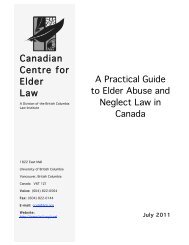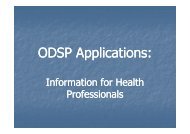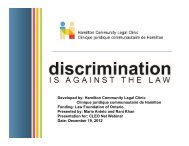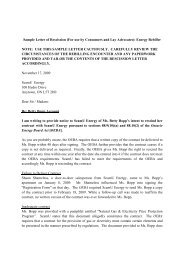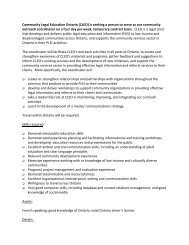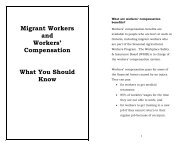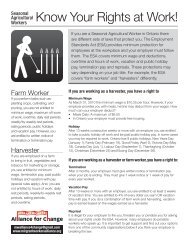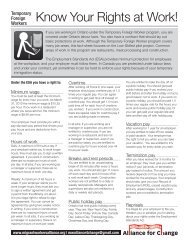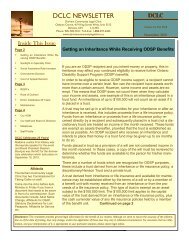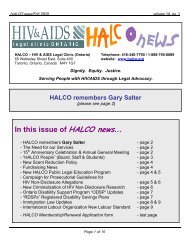Migrant Workers - Your Legal Rights
Migrant Workers - Your Legal Rights
Migrant Workers - Your Legal Rights
Create successful ePaper yourself
Turn your PDF publications into a flip-book with our unique Google optimized e-Paper software.
<strong>Migrant</strong> <strong>Workers</strong><br />
and<br />
Employment<br />
Insurance<br />
What You Should<br />
Know
The purpose of this booklet is to provide a<br />
practical guide for migrant workers who<br />
want to obtain Employment Insurance<br />
(EI).<br />
Although migrant workers are excluded<br />
from some of the EI benefits that other<br />
workers in Canada are able to receive, we<br />
have included a discussion of all types of<br />
EI benefits in the hopes that one day all<br />
workers will be entitled to receive equal<br />
access to them.<br />
Although designed to help workers<br />
individually, it is hoped that those who<br />
learn how to file for EI, through this guide,<br />
will one day help those who do not know<br />
how to do so.<br />
Disclaimer:<br />
Service Canada regularly changes the<br />
required number of eligible hours to<br />
1
eceive benefits. It will also periodically<br />
change the amount of benefits to be paid<br />
out, the amount of money a person can<br />
earn while on EI, etc…<br />
This brochure is current as of June 2010.<br />
You should check with Service Canada on<br />
any item describing a specific amount of<br />
money or hours.<br />
What is Employment Insurance<br />
Employment Insurance (EI) is a system to<br />
provide temporary financial assistance to<br />
workers who become unemployed through<br />
no fault of their own.<br />
If you lose your job or become unable to<br />
work, Employment Insurance can cover<br />
part of your lost wages for a limited<br />
duration of time.<br />
2
Although not all types of EI benefits are<br />
available to most migrant workers, some<br />
EI benefits are available to workers in<br />
Canada with valid work permits;<br />
including migrant workers who are part of<br />
the Seasonal Agricultural <strong>Workers</strong><br />
Program or workers who came to Canada<br />
through a recruiter (for example, live-in<br />
caregivers or temporary foreign workers).<br />
What is the History of Employment<br />
Insurance<br />
What was originally called Unemployment<br />
Insurance began in Canada in 1940.<br />
<strong>Workers</strong> who were experiencing the<br />
devastating effects of the Great Depression<br />
organized and decided to collectively<br />
demand that the government take<br />
responsibility for the high rates of<br />
unemployment. Because of workers<br />
organizing, the view of the government<br />
and the public shifted to see<br />
3
unemployment as an involuntary social<br />
problem instead of personal failing.<br />
<strong>Workers</strong> demanded a collective social<br />
safety net to take care of themselves and<br />
their families in times of need and the<br />
Unemployment Insurance system was<br />
born.<br />
How does Employment Insurance work<br />
Both workers and employers pay into the<br />
EI system in Canada. You will know if you<br />
pay into the EI system because your<br />
employer deducts money from your pay<br />
each pay period. These deductions should<br />
be explicitly labelled on your pay stub as<br />
EI contributions.<br />
Service Canada is the government<br />
department in charge of the EI system in<br />
Canada. When deductions are made from<br />
your pay cheque, the money goes to them.<br />
4
Service Canada decides whether to allow<br />
someone to collect benefits after an<br />
application has been made, pays benefits<br />
if the claim has been allowed, and will<br />
follow your claim through from the<br />
beginning to the end of your entitlement<br />
period.<br />
What EI benefits can migrant workers<br />
apply for<br />
There are different types of EI benefits:<br />
<br />
<br />
<br />
<br />
Regular benefits<br />
Sickness benefits<br />
Maternity/parental benefits<br />
Compassionate care benefits<br />
<strong>Migrant</strong> workers can receive<br />
maternity/parental benefits and<br />
compassionate care benefits. Sickness<br />
benefits may be available to migrant<br />
workers in certain circumstances. Sadly,<br />
regular benefits are generally not<br />
5
available to migrant workers, although<br />
there are special cases.<br />
When applying for EI benefits of any type,<br />
you should check to see if you are entitled<br />
to the “Family Supplement.” <strong>Workers</strong><br />
normally will receive 55% of their salary<br />
but can automatically receive up to 80% of<br />
their salary if one spouse is receiving the<br />
Canada Child Tax Benefit and their<br />
income is therefore below a certain level.<br />
Since migrant workers are denied access<br />
to the Canada Child Tax Benefit, you<br />
won’t automatically receive the Family<br />
Supplement.<br />
When should I apply for EI benefits<br />
You should apply for EI as soon as you<br />
stop working, even if you do not yet have<br />
your Record of Employment [ROE]. If you<br />
wait more than four weeks to apply, you<br />
6
may not be able to receive benefits for<br />
some of the weeks you are out of work.<br />
What if my Employer won’t give me my<br />
ROE<br />
Employers are required by law to provide<br />
this within 5 days of your last day of work.<br />
If they do not do this, you can contact<br />
Service Canada and ask them to help you<br />
to get this. You might need to show proof<br />
of your employment like paycheques or tax<br />
forms (T4s) if the employer has not yet<br />
provided you or Service Canada with your<br />
ROE.<br />
If you are having trouble getting your<br />
ROE, there is a form, “Request for Record<br />
of Employment”, that can be used to ask<br />
Service Canada to obtain your ROE on<br />
your behalf.<br />
7
TYPES OF BENEFITS<br />
What are Regular EI benefits<br />
Regular benefits are paid to unemployed<br />
workers who lose their jobs or who are<br />
temporarily laid off work through no<br />
fault of their own - for example, because of<br />
a shortage of work or seasonal layoff.<br />
<strong>Migrant</strong> workers are generally not able to<br />
claim these benefits.<br />
<strong>Workers</strong> who are eligible for EI Regular<br />
Benefits are entitled to 55% of the<br />
average insured earnings up to a<br />
maximum of $447 per week. The amount<br />
of weeks a worker can get depends on how<br />
many insured hours of work you have<br />
performed in the 52 weeks before you stop<br />
working (the more hours, the more weeks<br />
of benefits). Benefits stop when you are<br />
able to find employment or when you run<br />
out of your maximum amount of benefits.<br />
8
The maximum number of weeks you can<br />
receive benefits is usually 52.<br />
A BIT OF HISTORY. In 1967 the Canadian<br />
government introduced legislation that disqualified<br />
most farm workers in Canada from receiving<br />
Unemployment Insurance. Law makers created the<br />
rule of having to work with one employer for more<br />
than 16 weeks before getting EI. Because immigrant<br />
farm workers were recruited for many different<br />
farmers throughout the season, most workers could<br />
not meet this one employer-16 week qualification. A<br />
movement of farm workers who knew that this<br />
wasn’t right slowly and steadily began to organize.<br />
In the 1980’s the government again tried to further<br />
restrict UI from farm workers by trying to say they<br />
should work more hours with an employer than<br />
other Canadian workers.<br />
By this time, thousands of farm workers had banded<br />
together under the banner of the Canadian<br />
Farmworkers Union. They held rallies, signed<br />
petitions and marched through downtown<br />
Vancouver to demand the end of discriminatory<br />
practices with UI. Through their actions, they<br />
forced the government to bow to public pressure and<br />
the government was forced to abandon its plans for<br />
the discriminatory legislation.<br />
9
What reasons are now given for denying<br />
migrant workers Regular EI benefits<br />
To receive regular benefits you must be<br />
“available for work in Canada”.<br />
<strong>Migrant</strong> workers whose work permit<br />
limits them to one employer are<br />
ordinarily considered unavailable for work,<br />
and are therefore denied benefits<br />
(although there may be exceptions, see<br />
below). To be eligible for EI, you must be<br />
“ready, willing and able” to work. If you<br />
are only legally able to work for one<br />
employer who no longer has work for you,<br />
the government will likely find you are not<br />
able (available) to work.<br />
In addition, migrant workers who return<br />
home or are repatriated are also<br />
considered unavailable for work in<br />
Canada.<br />
10
Despite paying into the system through<br />
deductions from each migrant worker’s<br />
paycheque, this discriminatory rule means<br />
migrant workers are generally unable to<br />
apply for EI Regular Benefits.<br />
Why should we have to pay into a system<br />
that we are denied access to This is<br />
nonsense.<br />
This is definitely nonsense. I feel like<br />
we’re being scammed. We shouldn’t have<br />
to pay that money.<br />
You’re right. Maybe we shouldn’t have to pay. But I could<br />
really use Regular EI benefits when I go home. 55% of my<br />
earnings would go a long way in helping me and my family<br />
when I am out of work.<br />
Yes it would. Can Canadian<br />
farm workers get EI<br />
11
Yes because like us, they are<br />
seasonally employed. They get EI<br />
benefits when it’s off-season.<br />
That makes me angry. Why should different<br />
rules apply to us because they tell us to go<br />
home at the end of the season We are part<br />
of Canada as much as anyone else. We work<br />
hard just like other workers in the country.<br />
We should have the same rights and benefits.<br />
Absolutely; these benefits belong<br />
to us.<br />
Under What Circumstances Might I be<br />
Eligible for Regular EI Benefits<br />
There may be certain circumstances where<br />
a migrant worker is entitled to Regular EI<br />
Benefits:<br />
1. If you have a work permit that<br />
allows you to work with any<br />
employer then you are considered<br />
available for work. However, you<br />
must stay in the country while you<br />
are looking for work.<br />
12
2. A person whose work permit<br />
includes a restriction that only<br />
allows them to work for a specific<br />
employer is not normally considered<br />
available for work when work for<br />
that employer is no longer available.<br />
As a result, you may not be eligible<br />
for EI benefits. However, other<br />
factors should be considered in<br />
Service Canada’s decision as well.<br />
Service Canada must consider a<br />
statement of availability from the<br />
worker that explains how he or<br />
she is available for work. You<br />
should include this statement with<br />
your application for EI. It should<br />
state that once you find a new<br />
employer , you will contact<br />
Citizenship and Immigration<br />
Canada to change your work permit.<br />
The statement should also explain<br />
your job search (i.e. a recruiter or<br />
13
handing out resumes, etc.). The<br />
decision maker will be looking for<br />
reasons that would make you<br />
unavailable to return to work.<br />
<strong>Workers</strong> who submit that they are<br />
available for work and looking for<br />
work must not have an expired work<br />
permit and they should remain in<br />
Canada. This strategy of arguing<br />
you are ready, willing and able<br />
(available) for work can be used to<br />
obtain EI both for permanent loss of<br />
employment and for short term<br />
layoffs (where you may return to<br />
work with the same employer).<br />
What are my responsibilities if I receive<br />
Regular EI Benefits<br />
<br />
<br />
You must complete a report every two<br />
weeks by phone, mail or internet<br />
(address at the back of the book)<br />
In the report you will:<br />
14
‣ Report if you are currently in<br />
Canada<br />
‣ Confirm that you are ready, willing<br />
and able to work;<br />
‣ Confirm that you are looking for<br />
work<br />
‣ Report if you have received any<br />
money for work you have done<br />
<br />
You must inform Service Canada when<br />
you return to full-time work<br />
IMPORTANT: While receiving EI Regular<br />
Benefits, you must report to Service<br />
Canada every two weeks – even if you<br />
don’t have any income to report. This<br />
can be done by phone, internet or at a<br />
Service Canada office. If you don’t, Service<br />
Canada can require you to pay back the<br />
benefits you received and will charge you a<br />
penalty. The penalty can be up to 3 times<br />
the benefits you received. The penalty can<br />
15
also require you to work additional weeks<br />
to qualify for EI in the future. Even if you<br />
have no formal way of reporting, you<br />
should write a letter with your name and<br />
client number on it and mail it to Service<br />
Canada every two weeks. You should also<br />
keep a copy for yourself. It would be wise<br />
to do this even if you cannot get it<br />
translated to English.<br />
Justice for <strong>Migrant</strong> <strong>Workers</strong> (J4MW) Demands for<br />
Change:<br />
<strong>Migrant</strong> workers must have equal access to<br />
Regular EI Benefits<br />
<strong>Migrant</strong> workers should not have to “be available<br />
SICKNESS for work BENEFITS: in Canada” What happens if I<br />
am too <strong>Migrant</strong> sick workers to work should not have to report to<br />
Service Canada every 2 weeks. Service Canada<br />
must recognize barriers migrant workers face<br />
because of lack of access to transportation,<br />
internet and potential language barriers.<br />
Service Canada must consider giving the “Family<br />
Supplement” even if workers do not receive the<br />
Canada Child Tax Benefit<br />
16
SICKNESS BENEFITS:<br />
What are sickness benefits<br />
Sick benefits are paid to workers who<br />
become sick, injured or are quarantined<br />
and cannot work for a period of time.<br />
What happens if I am too sick to work<br />
Service Canada can pay up to 15 weeks of<br />
benefits while you recover and seek<br />
medical treatment. You must be able to<br />
show that you are unable to work because<br />
of your injury or illness AND that if you<br />
were not sick or injured you would<br />
otherwise be able to work in Canada.<br />
Can migrant workers apply for sickness<br />
benefits<br />
Yes. If you stay in Canada, you can receive<br />
benefits. In some cases, if you are sick or<br />
injured and cannot work you will be sent<br />
home (repatriated) by your employer.<br />
Sending you home because you are sick or<br />
17
injured may not be legal. Canadian law<br />
suggests that you are allowed to stay in<br />
Canada until your work permit expires,<br />
however you can only work for the<br />
employer named on your work permit.<br />
Because you must be available for work in<br />
Canada, you cannot apply for sick benefits<br />
from your home country. If you are too<br />
sick or injured to work and you stay in<br />
Canada you can apply for EI sick benefits.<br />
For example, one migrant worker had<br />
appendicitis and stayed in Canada for<br />
medical treatment. He received sick<br />
benefits until he was well again and then<br />
he returned to work.<br />
What if I’m sick or injured because of<br />
an accident at work<br />
If you are sick because of an accident or<br />
injury that happened at work, you should<br />
18
tell your employer and doctor right away.<br />
The Workplace Safety and Insurance<br />
Board (WSIB) is in charge of workers who<br />
are injured at work. You can call the<br />
Industrial Accident Victims Group of<br />
Ontario (IAVGO) for information about<br />
filing a WSIB claim. Their contact<br />
information is listed at the back of this<br />
booklet.<br />
You must tell Service Canada about any<br />
benefits you receive from the WSIB. You<br />
must also tell the WSIB about any benefits<br />
you are receiving from Service Canada.<br />
You should apply for EI sick benefits even<br />
if you are receiving or applying for WSIB<br />
benefits. If you receive WSIB benefits for<br />
lost wages your EI claim will be set aside<br />
as long as you receive WSIB benefits.<br />
When WSIB benefits are over you can start<br />
to receive EI sickness benefits. The EI<br />
19
claim can be set aside for up to two years<br />
while you receive WSIB.<br />
Can I work while receiving sickness<br />
benefits<br />
Yes, but your earnings will be deducted<br />
from your benefits, dollar for dollar. You<br />
must tell Service Canada if you work while<br />
you are receiving EI benefits.<br />
Can I leave the country while receiving<br />
sick benefits<br />
Not ordinarily. You can only continue to<br />
receive sick benefits from EI while you are<br />
out of the country if you need to travel to<br />
another country to receive medical<br />
treatment which is not readily or<br />
immediately available in Canada at an<br />
accredited hospital, medical clinic or<br />
similar facility.<br />
20
What if I have private health insurance<br />
or sick leave credits with my employer<br />
Tell Service Canada. You must exhaust all<br />
your paid sick leave credits before you are<br />
eligible for EI sickness benefits. You must<br />
tell Service Canada if you have private<br />
health insurance, wage loss insurance or<br />
income from any other sources while you<br />
are sick. <strong>Your</strong> sick benefits will be reduced<br />
by the amount you are receiving from<br />
other sources. For example, if you are<br />
entitled to RBC health insurance while in<br />
Canada as being part of the farm worker<br />
program, you should tell Service Canada.<br />
MATERNITY/PARENTAL BENEFITS<br />
Pregnancy (“Maternity”) and parental<br />
benefits are paid by EI when a parent<br />
must leave work to deliver or care for a<br />
new child.<br />
21
What are maternity benefits<br />
Pregnancy benefits (often called Maternity<br />
benefits) are paid to the birth mother of a<br />
child just before and / or after the birth.<br />
When should I apply for maternity<br />
benefits<br />
Maternity benefits are paid for 15 weeks,<br />
after a two week waiting period. You can<br />
apply for maternity benefits as late as the<br />
date of the child’s birth or the date of the<br />
adopted child’s placement and as early as<br />
eight weeks before the due date. You have<br />
to prove the expected date of delivery or<br />
adoption of the child.<br />
Can I work while receiving maternity<br />
benefits<br />
Yes, but your earnings will be deducted<br />
from your benefits dollar for dollar. You<br />
must tell Service Canada if you work while<br />
you are receiving EI benefits.<br />
22
What are parental benefits<br />
Parental benefits are paid to workers who<br />
need time away from work to care for a<br />
newborn or adopted child. Many farm<br />
workers have applied for this benefit and<br />
received entitlement to it.<br />
Parental benefits can be collected by either<br />
parent of the child or shared by both<br />
parents if both parents qualify. New<br />
parents may be entitled to up to 35 weeks<br />
of benefits combined.<br />
There is a two week waiting period unless<br />
this was already served under Maternity<br />
Benefits.<br />
If your child is hospitalized after birth, you<br />
may be able to extend the start date you<br />
receive benefits up to one year although<br />
the total weeks of benefits received will<br />
23
emain the same. Call Service Canada<br />
right away if this happens.<br />
In Justice for <strong>Migrant</strong> <strong>Workers</strong>’ first trips,<br />
hundreds of migrant workers complained about<br />
how they paid into EI but received no benefits<br />
because they were not Canadian. Consuelo<br />
Rubio, a worker’s rights advocate that worked at<br />
the Centre for Spanish Speaking People at the<br />
time, examined the Employment Insurance Act<br />
and noticed there was no residency restriction to<br />
obtain parental benefits. A worker familiar with<br />
Justice for <strong>Migrant</strong> <strong>Workers</strong> heard about this and<br />
was interested in knowing more about his rights<br />
to parental benefits. He asked Consuelo to file<br />
the application with him. Although they had to<br />
face many obstacles, he eventually won his case.<br />
His baby was really sick that year and the money<br />
he received saved his child’s life. Since then,<br />
thousands of migrant workers have successfully<br />
received EI Parental Benefits totalling millions<br />
of dollars.<br />
Do I have to stay in Canada to receive<br />
parental benefits<br />
No. You do not have to stay in Canada to<br />
receive parental benefits. You can receive<br />
benefits in your home country if you are<br />
with your child (you can only receive<br />
24
enefits while the child is in your care).<br />
You must tell Service Canada if you are<br />
leaving the country and make sure they<br />
have any information needed to make sure<br />
your payment gets to you.<br />
When should I apply for parental<br />
benefits<br />
You should apply within one week after<br />
your child is born or adopted. You cannot<br />
apply for parental benefits before your<br />
child is born. You can apply either before<br />
you leave Canada or while you are in your<br />
home country.<br />
If your baby is born before you leave<br />
Canada, you should apply before you<br />
leave, the same week your baby is born.<br />
If the baby is due after you leave Canada,<br />
make sure to take the application papers<br />
with you. You should file the same week<br />
the baby is born. Benefits are usually<br />
25
paid from the date your application<br />
package is posted.<br />
What happens if I wait until I return to<br />
Canada to apply for parental benefits<br />
If you wait too long, you may be required<br />
to submit a late application. This is also<br />
called an “antedate” application. When<br />
submitting a late application, you must<br />
include an antedate form with your<br />
application. This form requires you to<br />
give convincing reasons that explain<br />
why you were not able to file your<br />
application earlier. Filing an antedate<br />
application can be difficult and you may<br />
want the assistance of a representative. If<br />
you are unsure whether you have missed<br />
the time to apply, you should contact<br />
Service Canada. You are also able to get<br />
an antedate form at most Service Canada<br />
locations.<br />
26
Can I work while I am receiving<br />
parental benefits<br />
Yes. You can earn up to $75/week or 40%<br />
of your benefits, whichever is higher, and<br />
still receive the full amount of your<br />
benefits. If you earn more, your additional<br />
earnings will be deducted from your<br />
benefits.<br />
You must tell Service Canada if you<br />
work in Canada or your home country<br />
while you are receiving parental<br />
benefits.<br />
What should I do when I return to<br />
Canada<br />
You must tell Service Canada as soon as<br />
you return to Canada and as soon as you<br />
return to work. If you return to work and<br />
continue to receive parental or maternity<br />
benefits, you will be required to pay back<br />
27
all of the benefits you received after the<br />
date of your return to work.<br />
Can I apply for both maternity and<br />
parental benefits<br />
Yes. A woman applying for maternity<br />
benefits can also apply for parental<br />
benefits. She can receive a maximum of<br />
50 weeks of combined benefits (15 weeks<br />
of maternity + 35 weeks of parental<br />
benefits).<br />
Do I need to fill out reports during<br />
maternity and/or parental benefits<br />
No, but you must fill out a form saying<br />
you will not be completing reports when<br />
you apply for benefits. Even if you do not<br />
complete reports, you must report income<br />
when you earn it.<br />
COMPASSIONATE CARE BENEFITS:<br />
What are compassionate care benefits<br />
Compassionate care benefits are paid to<br />
28
workers in Canada who must take time<br />
away from work to care for a seriously ill<br />
family member who has a significant risk<br />
of death in the next 26 weeks. You can<br />
receive up to 6 weeks of benefits. You<br />
must notify Service Canada as soon as the<br />
ill family member dies or no longer<br />
requires care or support.<br />
Can I combine Compassionate Care<br />
Benefits<br />
You can only receive benefits for as long<br />
as that family member continues to<br />
require support.<br />
Unemployed persons already on EI can<br />
also apply for compassionate care<br />
benefits. This would allow your regular EI<br />
benefits to resume after the<br />
compassionate care benefits were<br />
exhausted. Combining compassionate care<br />
benefits with other EI benefits such as<br />
parental leave and/or regular benefits is<br />
permitted. The maximum length of time<br />
29
allowed for any combination of EI benefits<br />
is 71 weeks.<br />
Who counts as a family member<br />
You can receive compassionate care<br />
benefits to provide care for your family<br />
members or the family members of your<br />
husband/wife or common law partner,<br />
including your:<br />
child<br />
wife/husband (including Common<br />
Law)<br />
father/ mother<br />
brothers/sisters<br />
grandchildren<br />
son/daughter-in-law<br />
brother/ sister-in-law<br />
uncle /aunt<br />
nephew/niece<br />
The spouses of the above family members<br />
are also considered family for the<br />
purposes of compassionate care benefits.<br />
Also, if there is a person who is “like<br />
family” to you, like a neighbour or close<br />
friend they may be considered family for<br />
30
the purposes of these benefits.<br />
Do I have to stay in Canada to collect<br />
compassionate care benefits<br />
No. You can leave Canada and go to the<br />
country where your sick family member is<br />
living. You must tell Service Canada before<br />
you leave.<br />
Can I work while receiving<br />
compassionate care benefits<br />
Yes. You can continue to work part time<br />
while receiving compassionate care<br />
benefits, as long as you can show that<br />
your regular weekly earnings from work<br />
have decreased by more than 40%. You<br />
can earn $75 per week or 40% of your<br />
weekly benefits (whichever is higher)<br />
without having your benefits reduced.<br />
When should I apply<br />
Apply as soon as you stop working.<br />
31
If you wait more than 4 weeks to apply<br />
after your last day of work you may not<br />
receive as many weeks of benefits as you<br />
would otherwise.<br />
Splitting Compassionate Care Benefits<br />
Family members working in Canada who<br />
are covered by EI can split the 6 weeks of<br />
benefits. For example, you could take 3<br />
weeks and have your brother take 1 week<br />
and your sister takes 2 weeks. These<br />
could overlap or be taken one after<br />
another.<br />
APPLYING FOR EI BENEFITS<br />
How do I apply in Canada<br />
‣ You can apply in person at your local<br />
Service Canada Centre. To find the<br />
Service Canada centre near you, call<br />
1-800-206-7218.<br />
‣ You can also apply online at<br />
http://www.servicecanada.gc.ca<br />
32
‣ To apply by mail, you must send a<br />
completed application form along with<br />
the required documents to Service<br />
Canada Centre (for address check<br />
back of brochure)<br />
How do I apply from out of the<br />
country<br />
If you have returned home, you can apply<br />
for EI maternity, parental or<br />
compassionate care benefits online or by<br />
mail. All claims received from people<br />
residing outside of Canada<br />
are processed by the office in Kingston,<br />
Ontario.<br />
If you have questions, you can call Service<br />
Canada at the following toll-free<br />
number: 1-877-486-1650 or write to the<br />
address provided at the back of the<br />
brochure.<br />
33
When will I receive my benefits<br />
You must serve a two-week waiting<br />
period for all benefits. This means that<br />
during the first two weeks of your claim,<br />
you will not receive any benefits.<br />
If you have submitted all the required<br />
information and you qualify for benefits,<br />
you can expect to receive your first<br />
payment approximately 4 to 6 weeks after<br />
your application is received.<br />
How do I receive my payment<br />
<strong>Your</strong> payments will either be sent to you<br />
by mail or will be deposited to your bank<br />
account. To have your payments<br />
deposited to a bank account, you have to<br />
fill out a form and provide a blank cheque<br />
[marked “VOID”] to Service Canada.<br />
34
What should I do if my application is<br />
late<br />
You can have your claim “antedated”<br />
which means that the claim can start<br />
before the date of the application under<br />
certain circumstances. Talk to Service<br />
Canada about this.<br />
What should I do if my application is<br />
denied or if EI makes a decision I do<br />
not agree with<br />
You have the right to appeal any negative<br />
decision within 30 days. It is important<br />
that you meet the time limit of 30 days to<br />
appeal. See sample letter on next page.<br />
35
Sample Letter<br />
Worker’s Name<br />
Address<br />
Date<br />
Service Canada<br />
Address that is on the letter of the<br />
decision<br />
Re: Social Insurance Number 123-456-789<br />
I disagree with the decision in your letter<br />
dated _________ and I request an appeal of<br />
this decision.<br />
Please write to me to tell me I have met the<br />
time limit to appeal.<br />
<strong>Your</strong>s truly,<br />
[SIGNATAURE]<br />
Worker’s Name<br />
36
You can contact your local community<br />
legal aid clinic if you need advice or if you<br />
think you may have missed the time limit.<br />
To find a clinic near you, you can look<br />
online at legalaid.on.ca or call<br />
1-800-668-8258 toll-free. Services are<br />
provided in over 120 languages.<br />
What happens if I work while I am<br />
receiving EI and do not report my<br />
income to Service Canada<br />
If you work or receive income from any<br />
other sources while you are collecting EI<br />
benefits, you must tell Service Canada.<br />
If you receive a decision that you failed to<br />
report income, you should immediately<br />
request an appeal of the decision. Contact<br />
<strong>Legal</strong> Aid Ontario 1-800-668-8258 to find<br />
a representative.<br />
37
How can you get involved in bettering<br />
your working conditions<br />
<br />
<br />
<br />
<br />
<br />
<br />
Join/work with organizations such<br />
as Justicia for <strong>Migrant</strong> <strong>Workers</strong> to<br />
demand change<br />
Talk to other workers about their<br />
concerns and experiences in Canada<br />
Talk to, and develop strategies with,<br />
family and community members in<br />
your local community<br />
Ask for support from the various<br />
Agricultural <strong>Workers</strong> Centres across<br />
Ontario (Simcoe, Bradford,<br />
Leamington, Virgil). These centres<br />
are for all workers!!!!<br />
Encourage workers to know their<br />
rights<br />
Encourage workers, their families<br />
and their friends to start worker<br />
groups to pressure both the<br />
38
Canadian government and<br />
governments in other countries to<br />
provide rights for workers.<br />
CHECKLIST:<br />
What you need in order to apply for<br />
ANY EI benefits:<br />
☑ Social Insurance Number (SIN)<br />
☑ Proof of your immigration status and<br />
work permit for the time you are<br />
claiming (a photocopy will do)<br />
☑ (only if you are applying in<br />
person)personal identification, e.g. your<br />
driver's licence, birth certificate, or<br />
passport<br />
☑ bank information so that your benefits<br />
may be directly deposited into your<br />
account<br />
39
☑ information about your most recent<br />
employment (hours of work, earnings<br />
and reasons for loss of work)<br />
☑ Have paid into the EI system through EI<br />
identified deductions from your<br />
paycheque<br />
☑ if you are applying late (after 4 weeks),<br />
you need an Antedate form explaining<br />
why you did not file on time<br />
There are additional steps that may be<br />
needed depending on what type of benefit<br />
you are applying for, however the above<br />
conditions are universal to all benefit<br />
types.<br />
ADDITIONAL INFORMATION YOU WILL<br />
NEED TO APPLY FOR VARIOUS EI<br />
BENEFITS:<br />
EI Regular Benefits<br />
☑ Record of Employment showing the<br />
40
minimum required number of insurable<br />
hours (check with Service Canada to<br />
confirm the required number of hours<br />
in your region). Request a paper copy<br />
from all of your employers in Canada in<br />
the last 52 weeks for the year you are<br />
applying<br />
☑ Have a work permit that has not<br />
expired<br />
☑ Sign a statement declaring your<br />
availability for work in Canada.<br />
☑ Remain in Canada<br />
Sick Benefits<br />
☑ Remain in Canada<br />
☑ Get a Record of Employment that shows<br />
that you have worked 600 hours with<br />
your employer(s) in the last 52 weeks.<br />
Request a paper copy from all of your<br />
41
employers in Canada in the last 52<br />
weeks for the year you are applying<br />
☑ Get a medical certificate that explains<br />
why you are unable to work and how<br />
long you will be unable to work<br />
☑ Pay any fees charged by your doctor for<br />
completing this certificate.<br />
Maternity Benefits [For Women Only]<br />
☑ Get a Record of Employment that show<br />
that you have worked 600 hours with<br />
your Canadian employer in the last 52<br />
weeks. Request a paper copy from all<br />
of your employers in Canada in the last<br />
52 weeks for the year you are applying<br />
☑ Provide proof of legal immigration<br />
status and a work permit if you are a<br />
migrant worker<br />
☑ Sign a statement declaring the expected<br />
42
or actual date of birth or adoption<br />
☑ Tell Service Canada if you leave the<br />
country<br />
☑ Report any income that you receive<br />
Parental Benefits<br />
☑ the SIN of the other parent if he or she<br />
has one<br />
☑ a statement declaring the child’s date of<br />
birth (or the birth certificate), or the<br />
date of placement if you are adopting<br />
☑ Get a Record of Employment (ROE)<br />
showing that you have worked 600<br />
hours with your Canadian employer in<br />
the last 52 weeks. Request a paper<br />
copy from all of your employers in<br />
Canada in the last 52 weeks for the<br />
year you are applying<br />
43
*Note: If you are claiming parental<br />
benefits for a previous year (i.e. if your<br />
baby was born in 2002) your work permit<br />
and ROE must be from the same year.<br />
You must also fill out an antedate form<br />
and give convincing reasons why you did<br />
not apply on time (for example, did not<br />
know about EI Parental Benefits because<br />
you are a migrant worker in rural Ontario<br />
without much access to social<br />
infrastructure, don’t speak English, don’t<br />
have access to internet, and/or work<br />
during the hours that Service Canada is<br />
open.) You should make sure you state<br />
the reasons that apply to you.<br />
Compassionate Leave<br />
☑ provide care or support to an ill family<br />
member<br />
44
☑ Get a Record of Employment that shows<br />
that you have worked 600 hours with<br />
your Canadian employer in the last 52<br />
weeks. Request a paper copy from all of<br />
your employers in Canada in the last 52<br />
weeks for the year you are applying.<br />
☑ submit an "Authorization to Release a<br />
Medical Certificate" completed and<br />
signed by your sick family member or<br />
their legal representative<br />
☑ submit a “Medical certificate for<br />
Employment Insurance Compassionate<br />
Care Benefits” completed and signed by<br />
a doctor saying that the ill family<br />
member has a significant risk of death<br />
within the next 26 weeks and requires<br />
care or support.<br />
45
Contact Numbers<br />
Service Canada<br />
299 Concession St.<br />
P.O. Box 210<br />
Kingston, ON K7L 5H5<br />
1-877-486-1650 [toll free]<br />
Centre for Spanish-Speaking People<br />
2141 Jane Street, 2 nd Floor<br />
Toronto, ON M3M 1A2<br />
416- 533-0680; 416-533-8545<br />
Agricultural <strong>Workers</strong> Alliance<br />
1-877-778-7565 [toll free in Canada]<br />
1-877-344-3472 [calling from Jamaica]<br />
01-800-681-1591[calling from Mexico]<br />
<strong>Legal</strong> Aid Ontario<br />
1-800-668-8258 [toll free]<br />
Industrial Accident Victims’ Group of<br />
Ontario [IAVGO]:<br />
416-924-6477<br />
1-877-230-6311 [toll free]<br />
1-866-521-8535 [toll free] [Spanish-speaking callers]<br />
This booklet contains general information. It is<br />
not a substitute for getting legal advice for<br />
your particular situation.<br />
Written by:<br />
Justicia for <strong>Migrant</strong> <strong>Workers</strong><br />
Centre for Spanish-Speaking People [CSSP]<br />
46
Edited and produced by:<br />
IAVGO [Industrial Accident Victims’ Group of<br />
Ontario]<br />
With funding provided by:<br />
The Law Foundation of Ontario<br />
47




